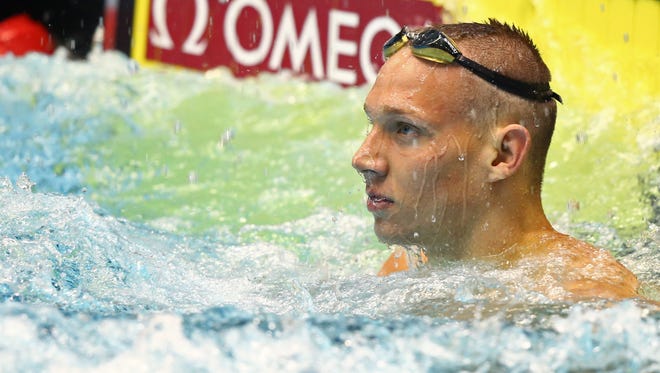Young swimmers set to make waves to fill void left by Phelps, Lochte
Even the most casual of sports fan is aware that Michael Phelps (sort of) swam against a shark, and even the most casual consumer of celebrity news knows Ryan Lochte is now the proud father of a baby boy.

Phelps and Lochte — the two most-decorated U.S. male Olympians ever — have for more than a decade been synonymous with the sport of swimming. They’ve transcended it, becoming household names as their medal counts and endorsement deals soared even when they ended up in headlines for the wrong reasons outside of the pool.
It’s hard to argue that the two figures — Phelps and his 23 gold medals in particular — have towered above the rest of the American male swimmers.
“There’s no question — they definitely kept a whole generation of swimmers from winning a whole lot of gold medals or getting on (national) teams,” said Bob Bowman, Phelps’ longtime coach and the 2016 U.S. Olympic men’s coach.
OLYMPIC COVERAGE:
USA Gymnastics hires new director of safe sport, in-house counsel amid sexual abuse scandal
Ryan Lochte cleared of criminal charge stemming from Rio Olympics incident
Now, with Phelps retired (again) and Lochte ineligible to compete at the 2017 FINA world championships that begin this weekend in Budapest, Hungary, there’s a noticeable lack of stardom on the men’s side.
Or, as Bowman put it, “There’s a lot of opportunity now for younger people.”
Brilliant and ruthlessly efficient Katie Ledecky undoubtedly will be the face of American women’s swimming for the foreseeable future. But as this week’s world championship meet highlights, the face of U.S. men’s swimming is far less certain.
Without Phelps and Lochte, both 32, this world championship meet might serve as a preview of sorts of American swimming that will stretch beyond both. That future seemingly can go one of two ways: The first being the emergence and sustained stardom of Caeleb Dressel, 20, who will compete in an array of individual events this week; or it might simply solidify the popular idea that the task of filling the void left by Phelps and Lochte will fall to multiple swimmers in multiple events.
“We’ve been blessed to have Michael and Ryan be those consistent faces for so long that I think some people forget how fickle the sport can be,” five-time Olympic gold medalist Nathan Adrian told USA TODAY Sports. “They were kind of these Swiss army knives. They did everything, and did everything really well. Now, the world just keeps getting faster and people have to specialize.”
Part of what made Phelps and Lochte ever-present was their versatility. Both swam the 200 and 400 individual medleys and won gold in multiple other individual events as well as relays. Now, as evidenced by the results of the Rio Games and this year’s national championships, more elite American male swimmers are focusing on — and finding success in — individual events.
Adrian, 28, for example, has always been a sprinter and remains the bridge between the old guard and the new in men’s swimming. That new guard starts with Ryan Murphy, who won gold medals in the 100 and 200 backstrokes in Rio. Kevin Cordes could become Murphy’s equivalent in the breaststroke, and Chase Kalisz in both IMs, depending on their results next week at worlds. The butterfly field is deeper now than it was when Phelps dominated it; Dressel, Tim Phillips, Jack Conger and Pace Clark will all compete in fly events in Budapest. Dressel also qualified in the 50 and 100 freestyles. With the exception of Phillips, all are 23 or younger.
“This is a really exciting time; hopefully people pay attention,” Adrian said. “This is the beginning. This is the beginning of the quad, the beginning of that story of how it rights itself without Michael and Ryan, currently.
“It’s next man up. We’re getting it done a lot better than I think anybody could have anticipated this, especially looking at 2014, 2015, when they were just dominating everything. ...
“I try to come up with explanations. Like, is it a sense of ownership? That people know they’re required to step up, or people had become complacent because they know that Ryan and Michael would get the job done for the next team? I don’t know. But it kind of seems like that may have happened. But it’s cool to see the younger guys now. They’re ready, and they’re certainly hungry.”
